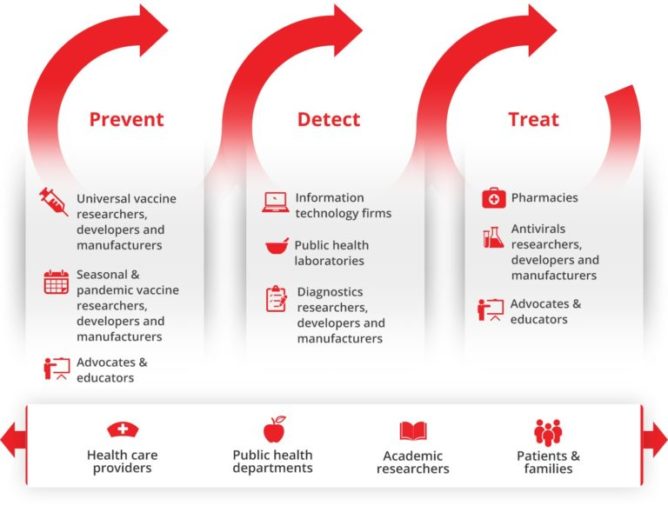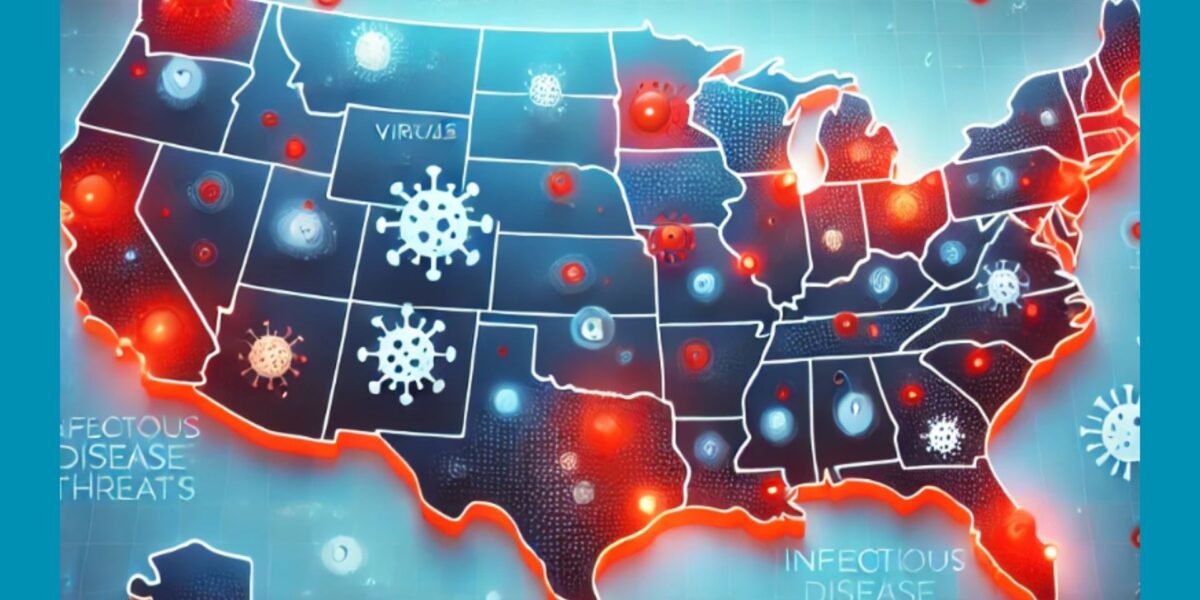
Special thanks to Senator Thomas A. Daschle, former US Senate Majority Leader and chair of the Coalition to Stop Flu, for this guest blog post on the importance of pandemic preparedness.
As the US grapples with one of the worst public health crises of our lifetime, the consequences of years of underfunding US healthcare infrastructure and research and development are becoming all too clear. The infrastructure used for the COVID-19 response today is the same infrastructure that was built to address seasonal and pandemic influenza (flu) over the last two decades. And unfortunately, federal investments have not kept up with evolving threats.
This month, in collaboration with the National Foundation for Infectious Diseases (NFID) and 20 other organizations across the healthcare and public health sectors, we launched a new Washington, DC-based advocacy organization dedicated to ending deaths from seasonal and pandemic flu. The Coalition to Stop Flu will work to promote a strong federal policy agenda and increased funding for flu programs.
The COVID-19 pandemic has demonstrated that the US is not adequately prepared for outbreaks of respiratory and other infectious diseases. Flu outbreaks occur every year and kill between 12,000-61,000 people in the US annually. The busy and unusual 2019-2020 flu season has made the COVID-19 response even more challenging, as the two viruses can produce similar symptoms.
It is unacceptable that, as a country, the US has not committed the resources necessary to fight flu—an annual public health threat that affects millions of US citizens. Furthmore, it is unacceptable that the lack of investment and preparedness by the federal government has significantly set back our response to COVID-19.
The diverse members of the multi-sector Coalition to Stop Flu represent the broad respiratory and infectious disease ecosystem, and include the following: American Heart Association; American Society for Microbiology; ApiJect; Association of Public Health Laboratories; Association of State and Territorial Health Officials; Cidara Therapeutics; Data Driven Health; Families Fighting Flu; Genentech, a member of the Roche Group; Georgetown Center for Global Health Science and Security; Gilead Sciences; Immunization Action Coalition; Infectious Diseases Society of America; Inovio; National Association of County and City Health Officials; NFID; Novavax; Sanofi; Seqirus; Trust for America’s Health; and Vir Biotechnology. More information about the Coalition is available at www.flucoalition.org.
The Coalition will work to promote a federal policy agenda that helps save lives, save money, and protect public health by:
- Increasing flu vaccination rates
- Improving flu vaccine effectiveness
- Upgrading rapid detection and diagnostic capabilities
- Developing new flu treatment options
- Modernizing public health data infrastructure
- Enhancing state and local response capabilities
- Strengthening pandemic response
- Expanding domestic manufacturing
 Equally important, the Coalition will also advocate for sustainable annual funding to strengthen our public health sector and develop the vaccines, preventives, diagnostics, and treatments needed to end the threat of seasonal flu and protect us from the next pandemic. The short-term funding provided to date as part of the COVID-19 response is an important first step, but is no substitute for a sustainable, long-term strategy. The US might be in a very different place today had so much of the infrastructure built for H1N1 flu not atrophied due to lack of adequate funding.
Equally important, the Coalition will also advocate for sustainable annual funding to strengthen our public health sector and develop the vaccines, preventives, diagnostics, and treatments needed to end the threat of seasonal flu and protect us from the next pandemic. The short-term funding provided to date as part of the COVID-19 response is an important first step, but is no substitute for a sustainable, long-term strategy. The US might be in a very different place today had so much of the infrastructure built for H1N1 flu not atrophied due to lack of adequate funding.
This effort will not be easy. But if there is one thing we have learned from the COVID-19 response, it is that we must invest today to be better prepared for tomorrow.
To join the conversation, follow NFID (@NFIDvaccines) and the Coaltion to Stop Flu (@flucoalition) on Twitter using the hashtags #FightFlu and #COVID-19, like NFID on Facebook, follow NFID on Instagram, join the NFID Linkedin Group, and subscribe to receive future NFID Updates.
Related Posts

Infectious Diseases in the News
Read recent news of interest from the world of infectious diseases including insights and updates on COVID-19, handwashing, hepatitis, malaria, measles, and respiratory syncytial virus (RSV) …

News Round-Up: Infectious Disease Threats
According to NFID website poll, there are several worrisome infectious disease threats. Read recent news on topics of greatest concern, including avian influenza (bird flu), measles, and respiratory syncytial virus (RSV) …

Vaccines and Heart Health: A Vital Connection
Heart disease can increase the risk of serious or fatal complications from respiratory diseases including COVID-19, flu, and RSV
